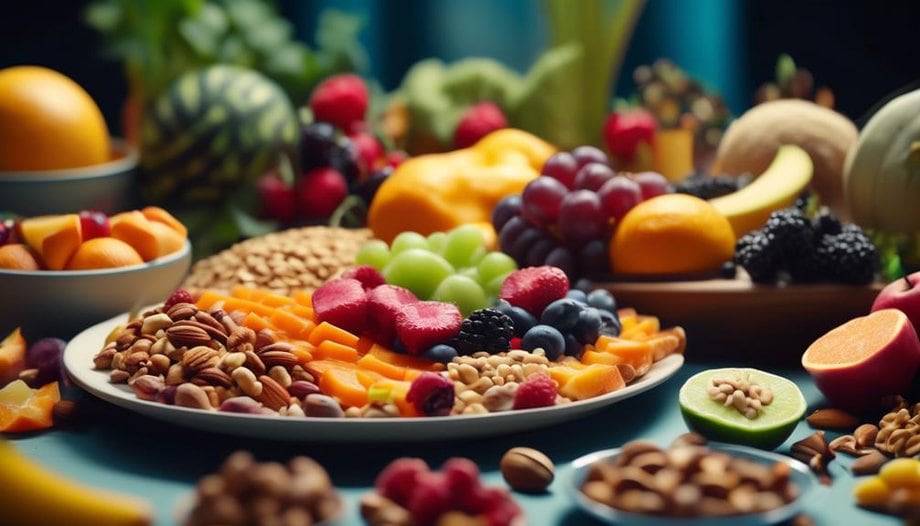How to Integrate Brain-Boosting Foods Into Your Child's Diet

Discover how to integrate brain-boosting foods into your child's diet and unlock their full cognitive potential.
Enhanced focus, memory, and overall brain health can be achieved by incorporating these foods into their meals.
By providing a well-balanced diet that includes nutrient-rich foods, you can support your child's brain development.
Some examples of brain-boosting foods include fatty fish, such as salmon and sardines, which are rich in omega-3 fatty acids.
Whole grains, such as oatmeal and brown rice, are also beneficial as they provide a steady release of energy to the brain.
Leafy green vegetables like spinach and kale are packed with antioxidants and vitamins that support brain health.
Additionally, berries like blueberries and strawberries are high in antioxidants and have been shown to improve memory and cognitive function.
Nuts and seeds, such as almonds and pumpkin seeds, are another great addition as they contain essential nutrients like vitamin E and healthy fats.
Lastly, it is important to limit processed foods and sugary snacks, as they can have a negative impact on brain health.
By incorporating these brain-boosting foods into your child's diet and making healthy choices, you can help them reach their full cognitive potential.
Benefits of Brain-Boosting Foods
Boost your child's brainpower and enhance their cognitive function with these nutrient-packed brain-boosting foods. It's important to provide your kids with a healthy diet that supports their overall health and growth. By incorporating certain foods into their meals, you can help improve their brain function and cognitive abilities.
One important nutrient that can greatly benefit your child's brain is omega-3 fatty acids. These healthy fats are found in seafood such as salmon, tuna, and sardines. Omega-3s have been shown to improve cognitive functioning and support brain health. Including these foods in your child's diet can have a positive impact on their brain development.
Another group of foods that can benefit your child's brain are berries. Berries, such as blueberries, strawberries, and raspberries, are rich in antioxidants called anthocyanins. These compounds have been linked to improved brain function and memory. Adding a handful of berries to your child's breakfast or as a snack can provide a delicious and nutritious brain boost.
Leafy greens like spinach, kale, and lettuce are also important for brain health. These greens contain brain-protecting compounds that can improve cognitive function. Including them in your child's meals can provide essential nutrients and support their brain development.
Lastly, cocoa is a tasty treat that can also benefit your child's brain. Cocoa is rich in flavonoid antioxidants, which have brain-protective properties. Including small amounts of dark chocolate or cocoa powder in your child's diet can be a delicious way to support their brain health.
Incorporating these brain-boosting foods into your child's diet can have a positive impact on their overall health and cognitive abilities. By providing them with important nutrients, you can help improve their brain function and support their growth.
Incorporating Fish for Cognitive Function
Incorporate fish into your child's diet to enhance their cognitive function and support their brain growth. Fish, especially salmon, is an excellent source of omega-3 fatty acids, which are crucial for brain development and function. These omega-3 fatty acids have been linked to higher IQ scores and improved school performance in children. By integrating fish into their diet, you can provide them with the nutrients they need for optimal cognitive development.
When choosing fish for your child, it's important to opt for low mercury options to minimize potential negative impacts on cognitive function. Seafood such as shrimp, salmon, trout, and herring are good choices in this regard. These options are packed with brain-boosting nutrients without the added risk of high mercury levels.
To reap the cognitive health benefits of fish, it's recommended that children under 3 have a 1-ounce serving of seafood 2-3 times a week. By incorporating fish into their meals, you can provide them with the necessary nutrients to support their brain function and cognitive development.
However, it's important to avoid high-mercury seafood like tuna and swordfish, as these may have pollutants that can negatively impact cognitive function. By making informed choices and being mindful of the types of fish you serve, you can ensure that your child receives the maximum benefits of fish for their cognitive function.
Power of Protein-Rich Foods
To continue supporting your child's cognitive function and brain growth, let's now explore the power of protein-rich foods. Incorporating these foods into your child's diet can provide them with essential nutrients that are vital for brain health and development.
Here are three examples of protein-rich foods that can benefit your child's brain:
- Lean beef: Lean cuts of beef are an excellent source of protein, iron, and zinc. These nutrients are important for brain function and the production of neurotransmitters, which are essential for learning and memory.
- Whole eggs: Eggs are packed with nutrients like choline, vitamin B12, and omega-3 fatty acids. Choline is particularly beneficial for brain development, while vitamin B12 supports cognitive function. Omega-3 fatty acids are known to improve brain health and cognitive performance.
- Canned salmon: Salmon is rich in omega-3 fats, which are crucial for brain development and function. It also provides iodine and zinc, important minerals for brain health. Canned salmon is a convenient and affordable option that can be easily incorporated into your child's meals.
Importance of Colorful Fruits and Vegetables
Are you looking for ways to boost your child's brain power?
Including colorful fruits and vegetables in their diet is a smart choice. These vibrant produce are packed with antioxidants that support brain health and enhance cognitive function.
By incorporating a variety of colorful fruits and vegetables into their meals, you can ensure your child receives the essential vitamins and minerals crucial for their brain development.
Nutrient-Rich Vibrant Produce
Colorful fruits and vegetables, bursting with essential nutrients, hold the key to boosting your child's brain power and cognitive function. Including a variety of vibrant produce in your child's diet can provide them with a wide array of brain-boosting nutrients.
Here are three reasons why colorful fruits and vegetables are important for your child's brain health:
- Antioxidant-rich: The vibrant colors of fruits and vegetables indicate the presence of antioxidants and phytonutrients that are crucial for brain development. These antioxidants help protect the brain from damage caused by free radicals, improving brain function and supporting learning and memory.
- Nutrient-dense: Colorful produce is packed with vitamins, minerals, and protective compounds that support optimal brain function. For example, whole wheat, brown rice, and lean beef are high in nutrients like iodine, iron, and polyunsaturated fatty acids, which are building blocks for a healthy brain.
- Diverse nutrients: Consuming a rainbow of fruits and vegetables ensures that your child receives a wide range of nutrients that support their brain health. This variety helps prevent nutrient deficiencies, such as iodine deficiency, that can negatively impact brain function.
Support your child's brain by including a variety of colorful fruits and vegetables in their diet. These nutrient-rich foods can help improve brain function, attention, and overall cognitive health.
Enhancing Cognitive Function
Boost your child's cognitive function and support their brain health by incorporating a variety of vibrant fruits and vegetables into their diet. Research shows that colorful produce plays a vital role in brain development and function.
Berries, such as blueberries and strawberries, contain anthocyanins which promote brain health and improve cognitive function. Green leafy vegetables like spinach and kale are excellent sources of brain-protecting compounds, supporting healthy nervous system function. Oranges, packed with flavonoids and vitamin C, are essential for cognitive function and brain development.
Including brain-boosting foods like nuts, seeds, and omega-3 fatty acids can also improve cognitive function. Health experts suggest that a balanced diet, including lean meat and whole grains, provides the necessary nutrients for your child's brain health.
Boosting Brain Health With Whole Grains
Want to boost your child's brain health? Look no further than whole grains.
Packed with essential nutrients like B-vitamins, fiber, and minerals, whole grains provide a steady supply of glucose to nourish the brain and support its optimal function.
Plus, incorporating whole grains into meals and snacks is easy and delicious, so you'll have no trouble finding tasty recipes that your child will love.
Nutritional Benefits of Whole Grains
Incorporating whole grains into your child's diet can provide a steady supply of glucose for the brain, supporting optimal energy levels and cognitive function.
Here are three reasons why whole grains are important for brain growth:
- Steady Energy: The fiber in whole grains helps regulate glucose release, ensuring a consistent energy source for your child's brain. This means no more energy crashes or brain fog during the day!
- Nourishment for the Nervous System: Whole grains contain B-vitamins that nourish a healthy nervous system. These vitamins support optimal brain health and function, helping your child absorb and process new information effectively.
- Overall Brain Health: Including whole grain options like whole grain bread, brown rice, or oats in your child's diet can promote brain health and cognitive function. By supporting your child's brain health, you're setting them up for success in school and in life.
Try incorporating whole grains into your child's meals and snacks – it's an easy and delicious way to support their brain health! Remember, I provide tips and information, but it's always best to consult a healthcare professional for personalized advice.
Importance of Fiber Intake
To continue supporting your child's brain health, let's now explore the importance of fiber intake and how it can be boosted through incorporating whole grains into their diet. Fiber plays a crucial role in promoting healthy digestion and stable energy levels, which are essential for optimal brain function in young children. Whole grains, such as oats, quinoa, and whole grain bread, are a great source of fiber that can help support your child's brain health.
Here is a table to show you the fiber content of some common whole grains:
| Whole Grain | Fiber Content (per 1 cup) |
|---|---|
| Oats | 16 grams |
| Quinoa | 5 grams |
| Whole Grain Bread | 2 grams |
| Brown Rice | 3.5 grams |
As you can see, incorporating these whole grains into your child's diet can provide them with the fiber they need to support their brain health. Consider serving oatmeal or whole grain toast for breakfast, or using quinoa as a base for a nutritious lunch or dinner. By making sure your child gets enough fiber from whole grains, you are giving their brain the boost it needs.
Delicious Whole Grain Recipes
Looking for delicious ways to boost your child's brain health with whole grains? Here are three kid-friendly whole grain recipes that will nourish their brain cells and support the growth and functioning of their nervous system.
- Spinach Salad with Quinoa:
Toss together fresh spinach leaves with cooked quinoa for a nutrient-packed meal. Spinach is high in iron, which helps prevent iron deficiency and supports brain health. Quinoa is a whole grain rich in B-vitamins that nourish the nervous system.
- Salmon Salad on Whole Grain Bread:
Make a tasty salmon salad using canned salmon mixed with Greek yogurt, diced celery, and a squeeze of lemon. Serve it on whole grain bread for a delicious and brain-boosting lunch. Salmon is high in omega-3s, which support brain function and development.
- Kids' Favorite Oatmeal:
Start the day with a warm bowl of oatmeal made with whole rolled oats. Add some sliced bananas and a drizzle of honey for extra flavor. Oats provide a constant supply of glucose to the brain, improving short-term memory and attention.
Incorporating these whole grain recipes into your child's diet won't only satisfy their taste buds but also support their brain health and overall well-being.
Nuts and Seeds for Cognitive Enhancement
By adding nuts and seeds to your child's diet, you can boost their cognitive function and support their overall brain health. Nuts and seeds play an important role in enhancing cognitive abilities due to their rich nutrient content. They're packed with essential nutrients like vitamin E, zinc, folate, iron, and protein, all of which are linked to better brain health and cognitive enhancement.
Including nuts and seeds in your child's meals and snacks can help boost their cognitive performance. Studies have shown that nut consumption is associated with improved cognitive function in children and college-aged students. So, why not introduce these new foods into your child's diet and witness the positive effects?
Nuts and seeds aren't only delicious but also packed with omega-3 fats, which are essential for brain development. These healthy fats help prevent cognitive decline and support optimal brain function. You can easily incorporate nuts and seeds into your child's diet by sprinkling them on top of yogurt or cereal, adding them to smoothies, or using nut and seed butters as spreads.
Dairy Products for Brain Development
Boosting your child's brain health and cognitive function can be further supported by including dairy products in their diet. Dairy products, such as yogurt, provide essential nutrients that contribute to brain development and overall health.
Here are three reasons why you should integrate dairy products into your child's diet:
- Protein and Iodine: Yogurt and other dairy products are rich sources of protein and iodine, which are important for brain development. Protein helps build and repair brain tissues, while iodine supports the production of thyroid hormones that are crucial for brain function.
- Enhanced Cognitive Function: Including yogurt in your child's diet can enhance cognitive function due to its rich nutrient content. The protein and B-vitamins found in dairy foods support brain tissue growth and function, helping your child stay focused and alert.
- Healthy Fats and Vitamins: Dairy products like yogurt are also sources of vitamin E and healthy fats, including omega-3 fatty acids. These nutrients play a vital role in brain health and can improve memory and cognitive abilities.
Frequently Asked Questions
How Can I Increase My Child's Brain Power With Food?
"You can increase your child's brain power with nutrient-packed snacks and mealtime brain boosters. Try healthy lunchbox ideas, creative ways to incorporate brain-boosting foods, and power-packed breakfast options. Sneak brain-boosting foods into meals and swap for brain-boosting snacks."
How Do You Stimulate a Child's Brain Development?
To stimulate your child's brain development, engage them in educational toys, reading aloud, music and rhythm, outdoor play, social interaction, creative play, problem-solving games, memory-enhancing exercises, and mindfulness and meditation.
What 3 Foods Improve Brain Function?
To improve brain function, incorporate fish oil for its nutritional benefits, add berries to support brain health, and include dark chocolate in your child's diet. These foods, along with eggs, nuts, seeds, green leafy vegetables, whole grains, yogurt, lean meats, and staying hydrated, can boost cognitive function.
What Are the 12 Brain Boosting Foods?
To boost your brain, focus on adding healthy fats like omega-3s, antioxidant-rich foods, whole grains, protein sources, nutrient-dense fruits, leafy greens, dark chocolate, nuts and seeds. These superfoods fuel your brain's potential.











